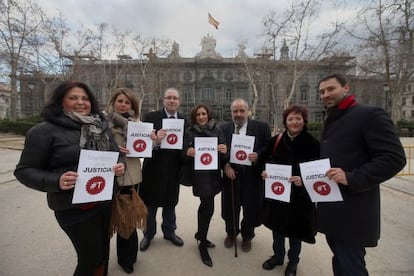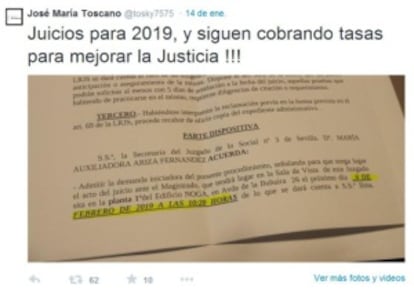“Twitter Brigade” takes on Spain’s sluggish justice system
Campaign highlights problems of overworked courts and hearings set for four years’ time

A photo of a Seville court document setting a hearing for 10.20am, February 6, 2019 – four years from now – has become a viral phenomenon on Spanish social networks.
Thousands of users, most of them on Twitter, have shared the image, often accompanied by the hashtag #JusticiaTardiaNoEsJustica (or, “Late justice is no justice”).
Although rumors of trial and hearing dates being set for 2019 had been circulating for months, few had seen evidence in the form of an official document. The image illustrates the inadequacies of Spain’s overworked and under-resourced justice system, as well as highlighting the growing use of the internet by legal-system workers concerned about the public’s mounting worries. Since 2013, the so-called Twitter Brigade has attracted lawyers, academics, journalists, solicitors and even a number of judges and public prosecutors to use the social network to raise public awareness about the problems Spain’s legal system faces.
I felt bad setting hearings for two or three years’ time, but there is simply no alternative” Judge Miguel Ángel Navarro
Their campaign has been waged on a daily basis, tweeting links to stories published in the media, as well as commenting on statements made by politicians and releasing information about court rulings and sentences. Every now and then they organize a major event focused on a specific topic: for instance, on January 5 they reminded Justice Minister Rafael Catalá of his promise to review recent legislation that drastically cut legal aid using the hashtag #CataláNoTQuedaOtra (or, “Catalá, you’ve no choice”), which soon became a trending topic.
“We’re simply taking advantage of the potential the social networks offer us,” says José Muelas, dean of the Cartagena College of Lawyers in the southern region of Murcia, and one of the founders of the Twitter Brigade. “The idea is as straightforward as setting an objective and directing it at a collective that wants to help.” He says the brigade has around 8,000 active members, whose tweets are distinguished by the use of a red #T.

“In #T, nobody is indispensable, and we’re all important,” says Verónica del Carpio, a lawyer and lecturer in civil law and another of the Twitter Brigade’s most active members. Her first tweet on September 2013 highlighted the issuing of hearing dates in four years’ time, and on February 7, 2014, she used the hashtag #JusticiaTardiaNoEsJusticia to tell the world about a labor dispute hearing set for February 21, 2017. She called on others to follow her lead. “I’ve been a lawyer since 1986, and the legal system has always been underfunded, but nothing like as badly as it is now. I have never seen hearing dates set for four years’ time,” she says.
Neither has Miguel Ángel Navarro, a judge in Seville’s Mercantile Court, Spain’s most overloaded, according to a recent report by the General Council of the Judiciary, the watchdog that oversees Spain’s legal system. The approved maximum number of cases a mercantile court can deal with each year is 399: last year, Navarro received applications for almost 3,000 hearings. When he was assigned to the court in 2009, he says he was setting hearing dates for six months hence. He now has one set for as far away as July 2018.
“We’ve been presented with appeals and complaints for delays, but we don’t have any say in the matter,” says Navarro, adding that the public has become resigned to the holdups. “When you tell people that their hearing will be in 2018, they’re surprised. But they don’t protest much. People have become used to justice working like this,” he says, admitting that he has as well.
“To begin with, I felt bad setting hearings for two or three years’ time, but now I can see that there is simply no alternative,” says Navarro, who has asked for extra judges at his court, and is hopeful he will soon be assigned at least one.
A lack of resources is the main reason for the delays, say many in the legal profession. But Sisej, a union that represents legal secretaries, says the problem is also a lack of organization. For example, each judge decides on which days hearings and trials will be held, and how many each day. “We’re saying that judges should not be allowed to decide on hearing dates, because their decisions are subjective, what is needed is unification of criteria,” says Rafael Lafuente, Sisej’s spokesman. He points out that the former Socialist Party administration attempted reform, suggesting that court secretaries set hearing dates, but that judges went on strike in protest. “They claimed their independence was being undermined, but we think it would make for a more flexible system,” says Lafuente.
Judges call for more resources
Disbelief is the most common reaction among members of the public who have been told that their hearing at a Seville social court will not be held until 2019 as a result of the huge number of cases being brought before it.
The delays were highlighted last week thanks to a social network campaign. “With money and the right approach, this is a problem that could be sorted out,” says Seville judge Francisco de la Chica, who accuses politicians of refusing to address the issue. “Politicians don’t care, and see us as a separate body. They have no interest in putting the situation right. Why do the Social Security and the Tax Office work?”
His concerns are shared by another civil servant who works in the court: “We’re talking about something that really affects a lot of people’s lives, and social and health issues, which this court deals with, should be a priority. People are too patient.”
The court has to deal with more than double the maximum 800 cases a year recommended by the General Council of the Judiciary. But setting hearing dates four years hence is not simply the result of the huge workload its judges have to deal with. In 2000, the court reduced its administrative staff from 10 to eight, while staff on sick leave are only covered if they are off work for more than three months, meaning that it takes longer for the paperwork involved in hearings to be organized.
Francisco Guerrero, Seville’s chief judge, is calling for the creation of six new social courts in the city, along with two extra judges in the meantime.
Tu suscripción se está usando en otro dispositivo
¿Quieres añadir otro usuario a tu suscripción?
Si continúas leyendo en este dispositivo, no se podrá leer en el otro.
FlechaTu suscripción se está usando en otro dispositivo y solo puedes acceder a EL PAÍS desde un dispositivo a la vez.
Si quieres compartir tu cuenta, cambia tu suscripción a la modalidad Premium, así podrás añadir otro usuario. Cada uno accederá con su propia cuenta de email, lo que os permitirá personalizar vuestra experiencia en EL PAÍS.
¿Tienes una suscripción de empresa? Accede aquí para contratar más cuentas.
En el caso de no saber quién está usando tu cuenta, te recomendamos cambiar tu contraseña aquí.
Si decides continuar compartiendo tu cuenta, este mensaje se mostrará en tu dispositivo y en el de la otra persona que está usando tu cuenta de forma indefinida, afectando a tu experiencia de lectura. Puedes consultar aquí los términos y condiciones de la suscripción digital.









































